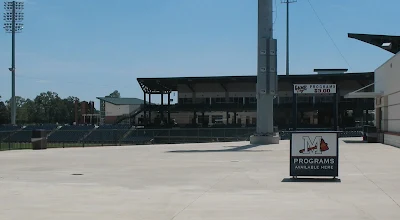Interview Part 2 of 3: Mike DeButch, Big Adjustments
 Mike DeButch in the Chicago Heights Parks District gym in November 2011. DeButch is the parks district's athletic director.
Mike DeButch in the Chicago Heights Parks District gym in November 2011. DeButch is the parks district's athletic director.Part 1: New Opportunities | Part 2: Big Adjustments | Part 3: Hardest Part
 Mike DeButch had already made one adjustment. Now he had to make another.
Mike DeButch had already made one adjustment. Now he had to make another.Coming out of Bradley University in 1984, DeButch made the switch from aluminum bats to wood bats, struggling to a .238 average. But he came back his second year, hitting .270.
Then came the other adjustment. The Padres asked the right hander to be a switch-hitter. In his first outing, he went 2 for 4.
"I was like 'aw, this is easy.' " DeButch recalled recently. "Then came the change-ups and the sliders. I struggled the whole year."
DeButch ended up hitting just .175 on the season, between AA Beaumont and single-A Reno.
"It's hard to do when you're 22, 23, out of the blue," DeButch said, "as opposed to having the precedent set at a younger age. It's a very tough thing to do, especially at the pro level. Every pitcher is trying to make the bigs and they're all throwing, giving it everything they've got."
The experiment over, DeButch found himself trying to prove himself all over again.
DeButch spoke with The Greatest 21 Days recently at his Chicago Heights office. DeButch has spent much of the last two decades as athletic director for the parks department in his hometown.
He joined the parks department after a professional playing career that spanned nine seasons. He made it to AAA, but he never made the majors.
DeButch spent his first year as a pro in at short-season Spokane, having been drafted in the eighth round by the Padres.
 Mike DeButch with Sandy Alomar Jr. in 2003.
Mike DeButch with Sandy Alomar Jr. in 2003.DeButch and the rest of the Spokane team stayed in the Gonzaga dorms. One of his teammates that year was a young Sandy Alomar Jr.
In 2003, DeButch saw his old friend again on a trip through the Northeast to mark his 40th birthday. One of the teams he saw play was Alomar's White Sox.
At Spokane, DeButch adjusted to professional life, growing up away from college life. "You're on your own," DeButch said. "It's up to you."
On the field, DeButch adjusted to wood bats. Wood bats, DeButch noted, have a narrow sweet spot. "It was a big adjustment," DeButch said.
But he finally made it, hitting that .270 at Reno his second season. Then came that disastrous experiment at switch-hitting.
 Trustmark Park outside of Jackson, Miss., in 2008. Mike DeButch played in Jackson with the AA Jackson Mets in 1988 and 1989. (G21D Photo)
Trustmark Park outside of Jackson, Miss., in 2008. Mike DeButch played in Jackson with the AA Jackson Mets in 1988 and 1989. (G21D Photo)Coming back to AA Wichita, again as a simple right-handed hitter, DeButch hit like he had something to prove. He brought his average back to .291. He also helped Wichita to the Texas League championship.
That championship was a highlight of his career, DeButch said. He still has the championship ring.
"You get a ring and you're etched in stone," DeButch said. "You're the best in the league. That's quite an accomplishment for everyone on our team."
DeButch returned to Wichita in 1988, before that trade mid-season to the Mets and his arrival in Jackson. The trade materialized after a series where DeButch didn't play. He wasn't sure if he was on the outs with the manager, or what. Then he learned of the trade.
The trade to the Mets came in DeButch's fifth season as a pro and he was still at AA.
In his sixth, he made it one step closer to the majors. Then injuries and illness took him that much further away.
Go to Part 3: Mike DeButch, Hardest Part
Part 1: New Opportunities | Part 2: Big Adjustments | Part 3: Hardest Part






